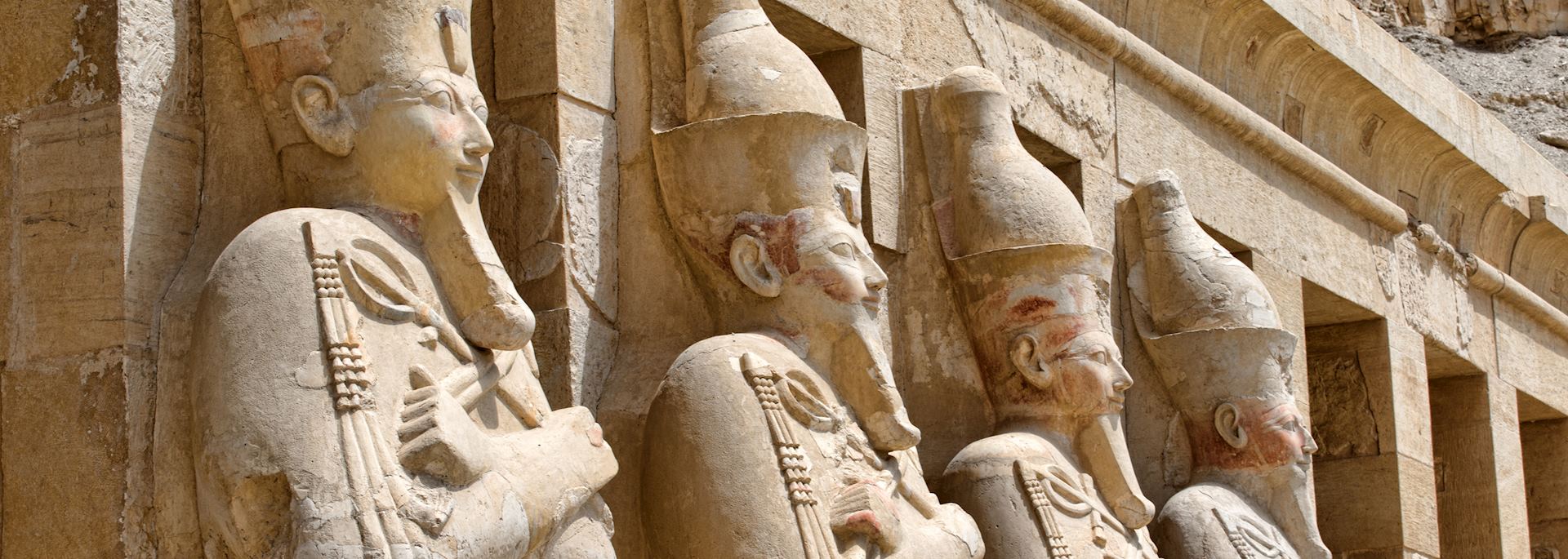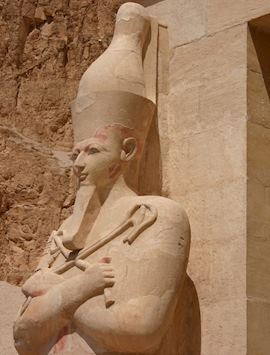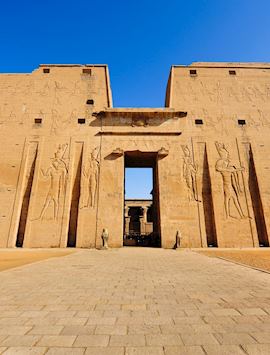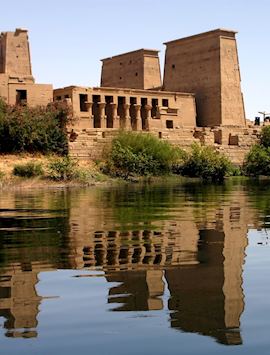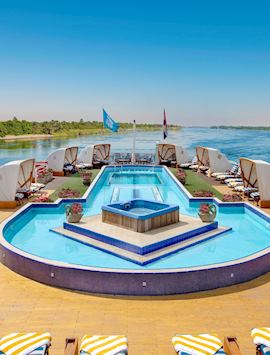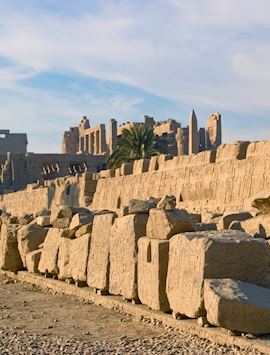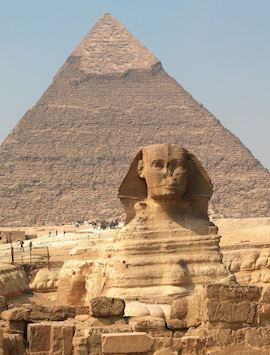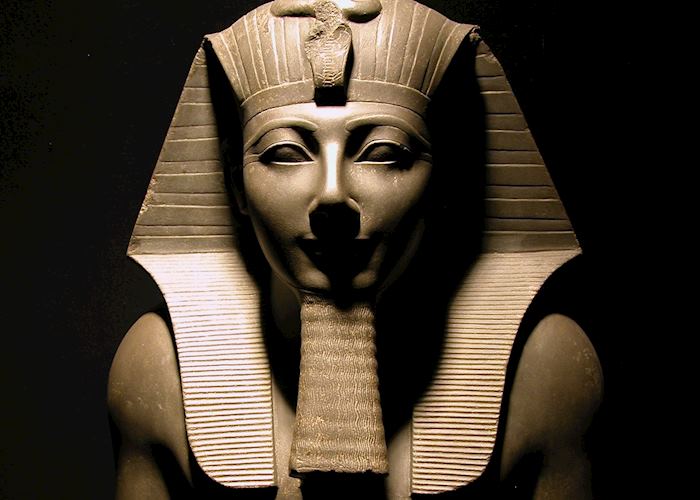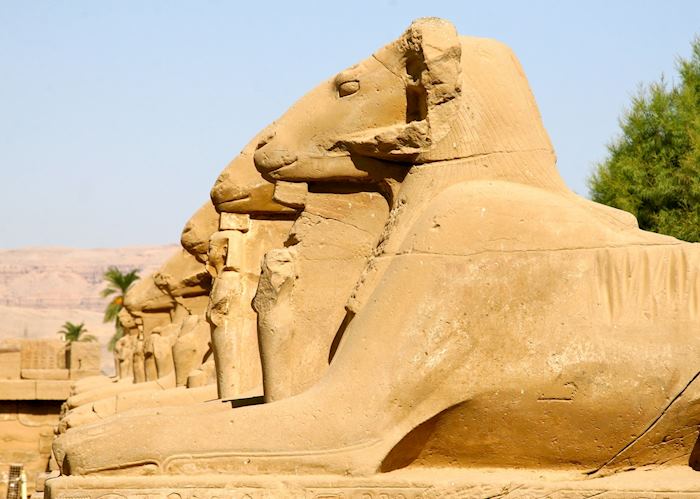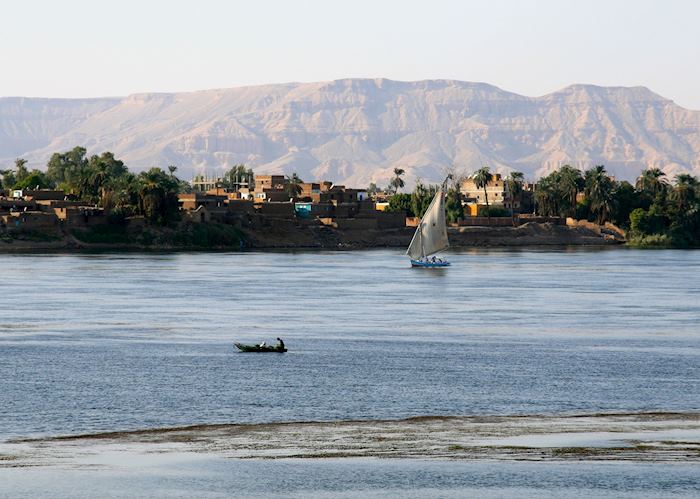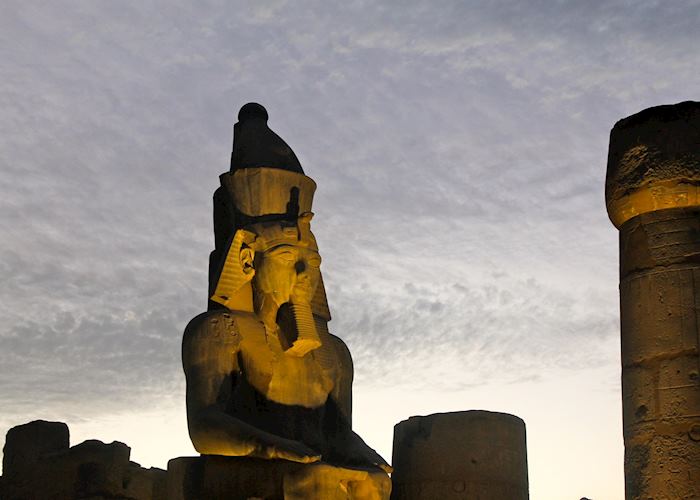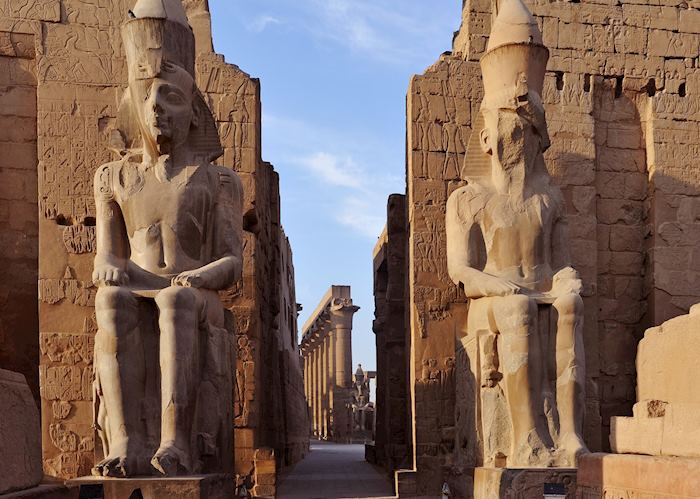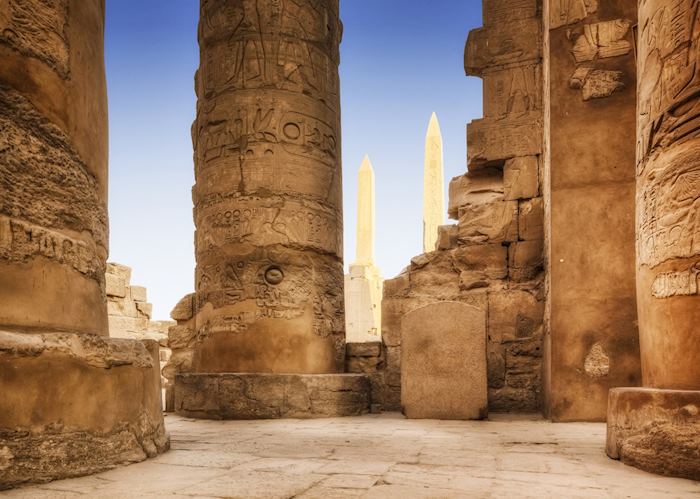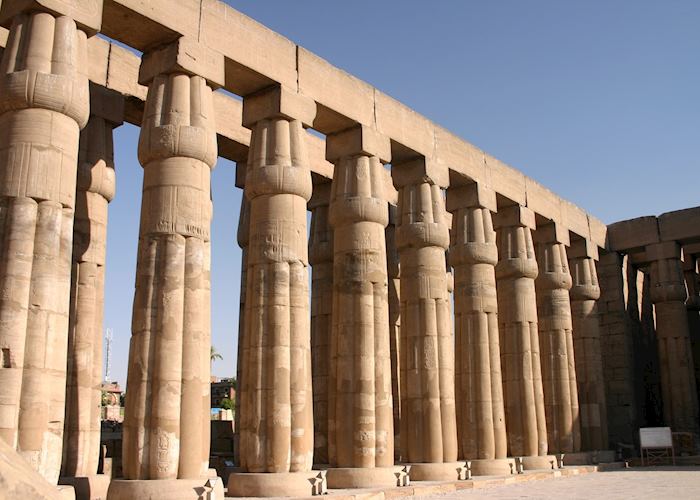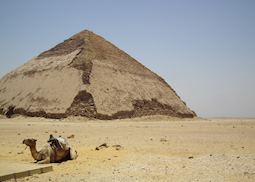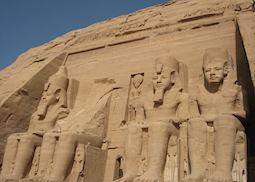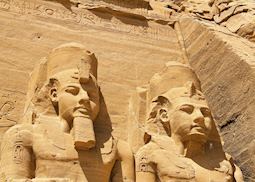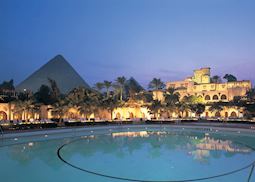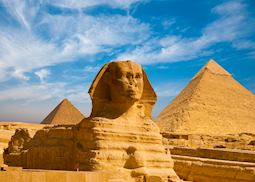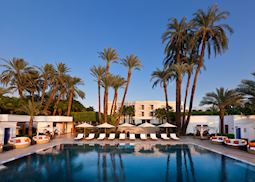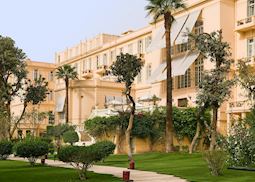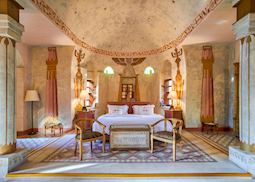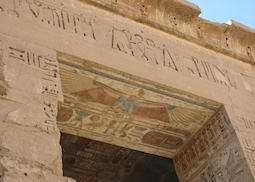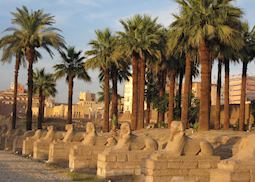Jump to:
Soaring obelisks, imposing temples, and the hidden tombs of the Valley of the Kings, all in Luxor, ancient Egypt’s most important city.
Whether you’re admiring a burial chamber’s still-bright paint, sailing down the Nile in a felucca, or wandering among the columns in one of the great temples, Luxor is where ancient Egypt remains most present. This was once mighty Thebes, the seat of the Egyptian pharaohs at their most powerful, and a visit here gives you a chance to appreciate the grandeur of their architecture up close.
The sun-worshipping Egyptians built their capital to reflect their cosmology. The places of the living — the sprawling complex of Karnak and the graceful halls of the Temple of Luxor — are located on the east bank, where the sun rises. The land of the dead, including the famed tombs in the Valley of the Kings, is located on the West Bank, where the sun sets.
The density of ancient sites makes this one of the busiest locales in Egypt, but we can arrange for private guides who’ll help steer you around the crowds and get the best views.
The East Bank — the Temples of Karnak & Luxor
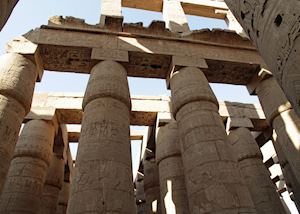 Built over the course of centuries, Karnak is a sprawling complex about as large as 190 football fields. This was the most important site of worship in all of Egypt, a constellation of shrines, obelisks, and courtyards built around the oldest and holiest of temples — the Temple of Amun, considered the earthly home of the god.
Built over the course of centuries, Karnak is a sprawling complex about as large as 190 football fields. This was the most important site of worship in all of Egypt, a constellation of shrines, obelisks, and courtyards built around the oldest and holiest of temples — the Temple of Amun, considered the earthly home of the god.
Nearby, at the Temple of Luxor, two seated statues and a pink-granite obelisk greet you as you enter a building that was known to ancients as the Southern Sanctuary. Smaller and less complex than Karnak, this was a sacred space, intended for priests and not the general public.
Both sites can get very busy and planning your tour early or late in the day can help avoid crowds. You can also visit at night, when the whole complex is underlit with a golden glow. The hypostyle colonnade in the Luxor Temple is particularly evocative when viewed under a canopy of stars. We can arrange for a privately guided visit to both sites on Luxor’s East Bank.
The West Bank — Valley of the Kings & the Valley of the Queens
This is Thebes’ necropolis, a city of the dead located under the horizon where the sun sets every evening. Here, you can explore pharaohs’ tombs that were hidden deep in wadis. Protected from light and looters, some of these tombs have wall decorations as bright as if they’d been painted a few decades ago rather than a few millennia ago. A few, like the burial chamber of Hatshepsut, have been restored to their former glory.
Perhaps the best-known tomb is that of the boy pharaoh, Tutankhamun — Howard Carter’s 1922 rediscovery of the mostly intact tomb, as well as the glittering collection of grave goods, helped ignite a world-wide passion for Egyptology. It’s easy for you to include a stop at King Tut’s tomb on a guided visit to the West Bank.
Best time to visit Luxor
It’s best to visit Luxor between October and April, when temperatures are still pleasantly warm but not unpleasantly hot.
who's been there
-
01993 838 92501993 838 410
- Make an enquiry
Suggested itineraries featuring Luxor
Our itineraries will give you suggestions for what is possible when you travel in Luxor, and they showcase routes we know work particularly well. Treat them as inspiration, because your trip will be created uniquely by one of our specialists.
Places near Luxor
- Upper Egypt 87 miles away
- El Quseir 106 miles away
- Aswan 113 miles away
- Hurghada 130 miles away
- The Red Sea 161 miles away
- Abu Simbel 242 miles away
- The Desert Circuit 286 miles away
- Dahshur 294 miles away
- Saqqara 300 miles away
Photos of Luxor
Our expert guides to exploring Luxor
Written by our specialists from their own experiences of visiting Luxor, these guides will help you make the most of your time there. We share both our practical recommendations and the best ways to appreciate Luxor at its best.
-
What to do in Egypt: our highlights guide ![Dahshur Pyramid, Egypt]()
What to do in Egypt: our highlights guide
What to do in Egypt: our highlights guide
Home to some of the world's most historical monuments and best dive sites, Egypt's size makes it possible for the first-time visitor to see many of its highlights in a relatively short trip.
Read this guide -
Honeymoons in Egypt ![Abu Simbel, Egypt]()
Honeymoons in Egypt
Honeymoons in Egypt
A private tour of Giza’s pyramids, an opulent Nile cruise to see the ancient temples and tombs, snorkelling amid the thriving reefs of the Red Sea — specialist Hannah discusses what you might do on a honeymoon in Egypt.
Read this guide -
Past civilisations of Ancient Egypt ![Abu Simbel, Egypt]()
Past civilisations of Ancient Egypt
Past civilisations of Ancient Egypt
Discover the culture and history of Ancient Egypt on a tailor-made trip. Our knowledgeable specialists can create a unique itinerary for you that suits your interests, including a few places that you might not have known about.
Read this guide -
Nile cruises: the route to ancient Egypt ![MS Pyramisa Nile Cruise, Aswan]()
Nile cruises: the route to ancient Egypt
Nile cruises: the route to ancient Egypt
A Nile cruise is the classic way of exploring Egypt. Drift down the Nile in a comfortable cruise boat, making stops to visit Ancient Egyptian temples and tombs. Egypt specialist Steve outlines how you can make the most of your cruise.
Read this guide -
Luxury Egypt: live like a pharaoh ![The Palace Wing and Pyramids, The Marriott Mena House Oberoi, Giza]()
Luxury Egypt: live like a pharaoh
Luxury Egypt: live like a pharaoh
A room at the foot of the Great Pyramid, an opulent ship on the Nile, and private guides — Egypt specialist Emma outlines the most indulgent ways to enjoy the country’s classic sights.
Read this guide -
Family holidays in Egypt ![Great Sphinx and pyramids, Giza, Egypt]()
Family holidays in Egypt
Family holidays in Egypt
From the sun-baked pyramids of Giza to the imposing Temple of Karnak, Egypt’s ancient monuments hold a special allure for people of all ages. Here, specialist Sharidan explains the best places to stay and things to do for a family visiting Egypt.
Read this guide
Accommodation choices for Luxor
We've selected a range of accommodation options for when you visit Luxor. Our choices usually come recommended for their character, facilities and service or location. Our specialists always aim to suggest properties that match your preferences.
-
![Hilton Luxor, Luxor]()
-
![Old Winter Palace, Luxor]()
Old Winter Palace
Luxor -
![Signature Suite, Al Moudira Hotel]()
Al Moudira
Luxor
Ideas for experiencing Luxor
Our specialists seek out authentic ways to get to know the places that could feature in your trip. These activities reflect some of the experiences they've most enjoyed while visiting Luxor, and which use the best local guides.
-
Explore the West Bank ![Madinat Habu]()
Explore the West Bank
Explore the West Bank
The West Bank at Luxor is known as the Theban Necropolis. This full day excursion will typically include the Tombs of the Theban rulers and the Temple of Hatshepsut.
View details -
Explore the East Bank ![Avenue of sphinxes, Luxor Temple]()
Explore the East Bank
Explore the East Bank
The modern town of Luxor has grown up around the two temples of Luxor and Karnak. The name Luxor is a corruption of the Arabic word "El Qsour", meaning castles or palaces, a reference to these two magnificent temples.
View details
